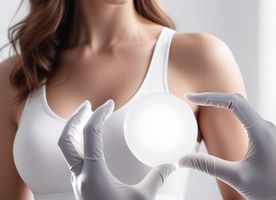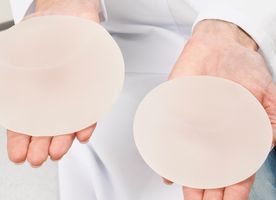Breast Biopsy in South Africa
Search and Compare the Best Clinics and Doctors at the Lowest Prices for Breast Biopsy in South Africa
















































































































































No Time?
Tell us what you're looking for and we'll reach out to the top clinics all at once
What is the cost of Breast Biopsy in South Africa?
The cost of a Breast Biopsy in South Africa varies depending upon several factors. This cost can potentially comprise charges for the procedure itself, surgeon's fees, anesthesia, and, in some cases, hospital or clinic charges. The price can also fluctuate depending on the specific type of biopsy technique employed, be it Fine Needle Aspiration (FNA), a Core Needle Biopsy (CNB), or a Surgical Biopsy.
What does a Breast Biopsy Procedure Involve?
A Breast Biopsy procedure primarily entails the extraction of a sample of breast tissue to examine and ascertain if any abnormalities detected are cancerous or non-cancerous. It is an indispensable step towards accurate diagnosis, providing critical insights into your health situation.
The precise nature of the procedure is largely determined by the type of Breast Biopsy you're undergoing, including fine needle aspiration, core needle biopsy, or surgical biopsy. In a fine needle aspiration, your doctor employs a very small needle to draw out fluid from a lump, essentially focusing on fluid-filled cysts. In a core needle biopsy, a larger needle is used in order to remove several small cylinders of tissue from an abnormal area within the breast. Surgical biopsy, on the other hand, usually implies that part or all of the abnormal area will be removed, typically under general anesthesia.
How Long Should I Stay in South Africa for a Breast Biopsy Procedure?
The length of stay in South Africa for a Breast Biopsy will largely depend on the specific nature of your biopsy. A fine needle aspiration or a core needle biopsy is typically an outpatient procedure, meaning you might not need to stay overnight at the hospital. In contrast, a surgical biopsy might require an overnight stay depending upon your overall health and the surgeon's recommendation.
Remember that your health and wellbeing are the primary priorities, which means adhering to your doctor’s advice for the length of your stay. It is essential to ensure you have ample recovery time post-procedure and follow-up appointments. This way, your health will be appropriately monitored following the biopsy.
What's the Recovery Time for Breast Biopsy Procedures in South Africa?
Recovery time for a Breast Biopsy is mostly quick, often spanning a few hours to a few days, contingent upon the type of biopsy performed and individual health circumstances. For a fine needle or a core needle biopsy, you might experience mild discomfort for a few hours post-procedure. A surgical biopsy may require you to limit your physical activities for a few days to a week.
Take heed that the recovery phase is characterized by personal health status and the specifics of the medical procedure itself. Always comply with your doctor’s instructions on wound care and medication. Pay attention to any signs of infection or heavy bleeding; promptly report such to your healthcare provider.
What's the Success Rate of Breast Biopsy Procedures in South Africa?
Breast Biopsy procedures in South Africa have a high success rate, predominantly due to their inherent role in achieving precise diagnoses. When carried out by a qualified medical professional in a reputable healthcare facility, a Breast Biopsy can provide highly accurate results, leading to the relevant treatment plan. It is essential to understand that the success of a biopsy refers not to successful treatment, but to the precision of the diagnosis rendered.
It's equally vital to maintain a comprehensive approach to your health, which means nurturing a healthy lifestyle alongside regular screenings. Remember that early detection often culminates in a superior prognosis. Consult your healthcare provider to discuss concerns and perspectives and to make informed decisions about your health.
Are there Alternatives to Breast Biopsy Procedures in South Africa?
Yes, there are alternative diagnostic methods available to a Breast Biopsy procedure in South Africa. Imaging tests such as a mammogram, ultrasound, or MRI can be used in conjunction with a physical exam to evaluate any abnormalities found in the breast.
However, it is vital to understand that while these methods help visualize anomalies, a biopsy remains the most definitive way to conclusively diagnose breast cancer. Every individual's health scenario is unique and, as such, warrants personalized medical attention. Your doctor will walk you through the most appropriate testing method based on your particular situation.
What Should You Expect Before and After the Procedure?
Prior to the procedure, your doctor will discuss the procedure, benefits, risks, and possible alternatives with you. You may be requested to avoid certain medications before the procedure and should inform your doctor of any allergies to anesthetics, bandages, or antiseptic solutions. Moreover, since the biopsy may involve considerable handling of breast tissue, some women might feel more comfortable scheduling the procedure post-menstruation when breasts are often less tender.
Following the procedure, some discomfort, bruising, and swelling may occur at the biopsy site. This is normal and should subside in a few days. Over-the-counter pain medication can deal with any discomfort, and ice packs can help reduce swelling. Your doctor will provide specific after-care instructions, which may include restrictions on physical activities and the application of a gentle dressing to the area.
What sort of Aftercare is Required for Breast Biopsy in South Africa?
The aftercare following a Breast Biopsy in South Africa primarily involves caring for the biopsy site to prevent infection and facilitate healing. You will be furnished with specific instructions by your healthcare provider concerning wound care, permissible physical activity, medication for managing any pain, and when to resume your regular diet. A follow-up appointment will be scheduled to discuss the biopsy results and any further necessary treatments.
Bear in mind that everyone's post-procedure journey varies. Some people might face short-lived pain while others may deal with bruising or swelling for a few more days. The paramount consideration is your wellness. Therefore, following your doctor's advice to the letter and keeping vigilant for any adversities like fever, excessive pain or prolonged bleeding at the biopsy site is crucial.
How Effective is Breast Biopsy Procedure in South Africa?
The efficacy of breast biopsies largely depends on the surgeon's skill level and the quality of the post-biopsy analysis. In South Africa, the technique has proven highly effective in detecting breast abnormalities. With advancements and increased accuracy of imaging systems, the chance of a precise diagnosis is significantly high.
Biopsies are instrumental in early detection of breast cancer, and statistics indicate a higher survival rate for cases caught early. Thus, the technique plays a vital role in the breast cancer survival rate in South Africa.
What are the Risks Associated with Performing a Breast Biopsy?
A Breast Biopsy, like any other medical intervention, carries a certain degree of risk. Nonetheless, it's essential to understand that these risks are generally meager and are far outweighed by the potential benefits of early cancer detection and diagnosis. The primary immediate risks usually include discomfort, bleeding, bruising, or infection at the biopsy site. Though these are usually mild and temporary, every patient's experience can be different.
In more nuanced terms, patients undergoing a breast biopsy might face the risk of altered breast appearance, especially if a large portion of tissue is removed. Furthermore, despite having a significantly high success rate, breast biopsies may occasionally yield false-negative results, leading to potential misdiagnoses. Consequently, it is incumbent to choose a reputed medical facility equipped with an adept medical team and advanced diagnostic facilities.
This information has been accurately sourced and verified by a medical professional for its accuracy, however, we strongly recommend you to consult with your doctor before pursuing medical procedures overseas.


























